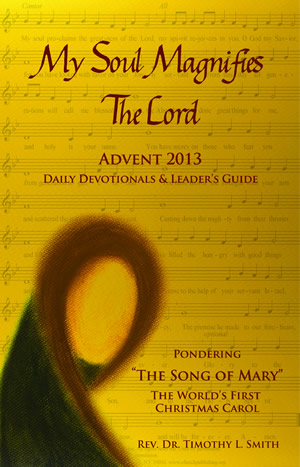
Luke 1:39-45
“Mary arose” is the King James’ more literal translation of the first words of today’s text. The word here for “arose” is anastasa, Greek for “resurrection”. Luke the Gospel writer is especially fond of the word anastasa, using it repeatedly throughout his Gospel. He wants us to know that it is the Spirit of God “raising” Mary to a new life and sending her on her way. Like many instances in Luke’s Gospel, an act of faith, or spiritual resurrection, sends one on a mission. The Spirit moves in Mary the moment she says, “Yes”, to God’s will.
Mary is “raised” by the Spirit and goes with haste to Judea, some one hundred miles away if you bypass Samaria, which Jews normally did. The text seems to indicate that Mary traveled this distance by herself, which would have been a dangerous journey, especially for a young girl traveling alone.
Mary will spend three months in Judea visiting her relative Elizabeth, the elderly wife of a temple priest, Zechariah, and pregnant with John the Baptist. Elizabeth was like her foremothers Sarah and Hannah in the Old Testament, unable to have children. But as Elizabeth was “getting on in years” (Luke 1:7), the Lord intervened and she conceived John the Baptist who would prepare the way for Messiah.
It is most remarkable that John the Baptist was “filled with the Holy Spirit even before his birth” (Luke 1:15). When the prenatal John the Baptist heard the voice of Mary he leaped for joy at the sound of the Messiah’s mother. At that moment Elizabeth was also filled with the Holy Spirit, and in a loud voice exclaimed: “Blessed are you among women, and blessed is the fruit of your womb”.
It is by the Holy Spirit Elizabeth understands that Mary carries the Messiah, and thus blesses Mary and her unborn Child. Elizabeth knows immediately that her baby stirring within is paying homage to the unborn Savior of the world.
In a culture that measured honor by age, it is significant that it is the elderly Elizabeth who counted herself honored by the visit of the younger Mary: “And why has this happened to me, that the mother of my Lord comes to me?” Elizabeth regarded herself unworthy that the mother of Messiah should visit her.
Being filled with the Holy Spirit, Elizabeth called Mary’s Baby her “Lord”. Elizabeth’s designation of the Baby as “Lord”, was significant. “Lord” is the Greek word Kurios, the very word used to translate the Hebrew Yahweh, the Old Testament God of Abraham, Isaac, and Jacob. Under the inspiration of the Holy Spirit, Elizabeth has supernatural knowledge that Mary’s Child is the Son of the Living God.
Then Elizabeth pronounced Mary as “blessed” for having taken God at His Word: “blessed is she who believed that there would be a fulfilment of what was spoken to her by the Lord.” Mary believed God, took Him at His Word, and staked her life on what God said. Mary illustrates that faith is not assent to certain truths, certain creeds, or doctrines, but faith is living reliantly on God and His Word. Like her forbear Abraham, the great icon of faith, Mary was “fully convinced that God was able to do what he had promised” (Romans 4:21).
Our Lord Jesus was careful to teach that believing and being obedient to His Word was more important even than being His mother:
Luke 8:19-21 “Then his mother and his brothers came to Jesus, but they could not reach him because of the crowd. And he was told, ‘Your mother and your brothers are standing outside, wanting to see you.’ But he said to them, ‘My mother and my brothers are those who hear the word of God and do it.’”
Luke 11:27 “While Jesus was saying this, a woman in the crowd raised her voice and said to him, ‘Blessed is the womb that bore you and the breasts that nursed you!’ But he said, ‘Blessed rather are those who hear the word of God and obey it.’”
PONDERING
- Can you think of a time when you sensed the Holy Spirit at work in your life? If so, explain.
- How would you define “faith” in your own words?
- Why do you think that there are so many stories in the Bible about great people being born to women who had been barren? (See for example Sarah, Genesis 17:17; Rebekah, Genesis 25:21; Rachel, Genesis 30:1ff; Manoah’s wife, Judges 13:2; Hannah, I Samuel 1:5ff.)



